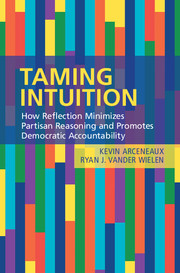Book contents
- Frontmatter
- Contents
- List of Figures
- List of Tables
- Preface and Acknowledgments
- 1 Democratic Accountability and the “Rational” Citizen
- 2 A Theory of Individual Differences in Reflection and the Intuitionist Model of Political Reasoning
- 3 Measuring Individual Differences in Reflection
- 4 Toeing the Line: Partisan Identities and Policy Attitudes
- 5 Throwing the Rascals Out: Partisan Identities and Political Evaluations
- 6 Can't We Disagree without Being Disagreeable? The Role of Reflection in a Polarized Polity
- 7 Reflections on the Role of Reflection in Democracies
- Appendix Details of Empirical Studies and Statistical Analyses\
- Notes
- References
- Index
2 - A Theory of Individual Differences in Reflection and the Intuitionist Model of Political Reasoning
Published online by Cambridge University Press: 30 August 2017
- Frontmatter
- Contents
- List of Figures
- List of Tables
- Preface and Acknowledgments
- 1 Democratic Accountability and the “Rational” Citizen
- 2 A Theory of Individual Differences in Reflection and the Intuitionist Model of Political Reasoning
- 3 Measuring Individual Differences in Reflection
- 4 Toeing the Line: Partisan Identities and Policy Attitudes
- 5 Throwing the Rascals Out: Partisan Identities and Political Evaluations
- 6 Can't We Disagree without Being Disagreeable? The Role of Reflection in a Polarized Polity
- 7 Reflections on the Role of Reflection in Democracies
- Appendix Details of Empirical Studies and Statistical Analyses\
- Notes
- References
- Index
Summary
Before citizens can hold elected officials accountable for their decisions, they must make sense of those decisions. Are they consistent with citizens’ values? Did they generate outcomes citizens liked or disliked? In order to understand how citizens answer these questions and arrive at opinions about politics, we need a model of how people process political information. The rational choice and social psychological models introduced in the previous chapter offered scholars a useful place to start. The rational choice framework provides a normative benchmark, while the social psychological framework provides an explanation for the gap between democracy in its ideal form and democracy in practice. But like all starting points, theoretical parsimony can become an obstacle to achieving a more complete explanation for how the world works.
The purpose of this chapter is to present an updated model of how people process political information that is more descriptively accurate than extant models. Fortunately for us, the behavioral revolution in the decision sciences, which lies at the intersection of economics and psychology, challenges the simplistic assumptions about human decision making that have been central to many rational choice and social psychological models of political behavior. Other scholars have drawn on behavioral insights to study how citizens form attitudes about politics and hold their elected representatives accountable (e.g., Dickson, 2006; Woon, 2012), and we extend their work by incorporating individual differences in psychological motivations into our updated model of political reasoning. Doing so is important because people do not process information in the same way. Some individuals critically evaluate information and behave in ways that approach idealized models of rationality while others do not. Building on this approach, we offer a theoretically grounded framework for capturing individual differences in reflection and apply this general framework to accomplish the specific aim of this book: understanding how people's partisan identities shape their political attitudes.
OPENING THE BLACK BOX
When people express an opinion – be it about politics, sports, food, fashion, or anything else – we observe the outcome of some internal process that occurs within the brain. That process involves making sense of the information received externally and deciding how it should influence one's attitudes, choices, and behavior (Lau and Redlawsk, 2006). For instance, let's say someone is trying to decide which candidate she should vote for in the upcoming presidential election.
- Type
- Chapter
- Information
- Taming IntuitionHow Reflection Minimizes Partisan Reasoning and Promotes Democratic Accountability, pp. 18 - 45Publisher: Cambridge University PressPrint publication year: 2017



